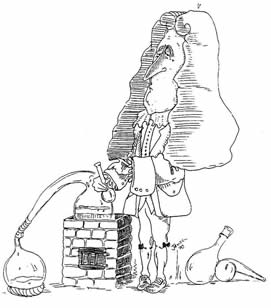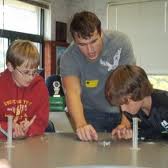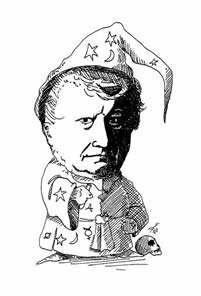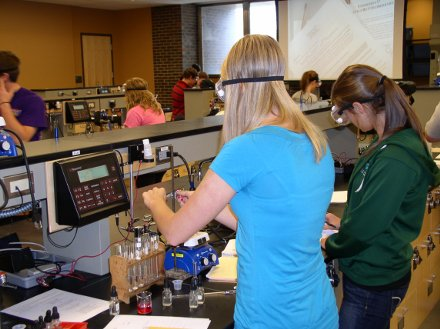
"The Sceptical Chymist"
September 2011
Robert Boyle (1627-1691). Irish chemist and natural philosopher. As a son of the Earl of Cork, Boyle was independently wealthy and so was able to live the life of an independent scientific "virtuoso." Best known for his advocacy of a mechanical corpuscular or particulate approach to physics and chemistry, as opposed to the older hylomorphic doctrines of Aristotle and Paracelsus, Boyle authored numerous books, of which his most famous was perhaps The Sceptical Chymist, first published in 1661. He is known to students of introductory chemistry largely through his discovery of Boyle's law (1662), which states that the volume of a gas varies inversely with applied pressure at constant temperature.
Courtesy of Professor William Jensen, Oesper Chair of the History of Chemistry and Chemical Education, University of Cincinnati

Chemists Identify New Way to Create Photovoltaic Devices
(PhysOrg.com) -- A promising new polymer-based method for creating photovoltaic devices, which convert sunlight into electricity, has been identified by chemists at the University of Massachusetts Amherst. Their new technique should lead to more efficient power production than achievable by the current generation of semiconductors.

The American Chemical Society has been awarded a $1 million chemistry public outreach grant from NSF. According to C&EN editor Sophia L. Rovner, the grant will be used to communicate the contributions of chemistry to society. This chemical education grant from NSF is timed perfectly because, 2011 is the International Year of Chemistry.
The grant "enables ACS efforts to sustain the momentum of IYC 2011," says ACS Executive Director and CEO Madeleine Jacobs . "Our members, committees, local sections, technical divisions, and our external IYC Partners—and their networks—will be vital to help the project be a success."
To learn more go to C&EN article ACS Wins $1 Million NSF Grant.

MeasureNet is pleased to announce that its blog will feature caricatures of notable chemists drawn by Professor William Jensen of the University of Cincinnati. The series will include a brief biographical summary of each individual authored by Jensen. The drawings will appear regularly on MeasureNet's its blog beginning in September, 2011.
I'm thrilled to have these Jensen works associated with MeasureNet. They'll add a very nice visual element to our media products. At the same time, they have a high degree of relevance to chemical education. Bill's drawings fit with our efforts to make the study of chemistry more interesting and germane to students of all academic backgrounds.
William B. Jensen, Ph.D. holds the Oesper Chair in the History of Chemistry and Chemical Education at the University of Cincinnati. He is also curator of the Oesper Collection of Rare Books and Portraits in the History of Chemistry and of the department of chemistry's apparatus museum. In the area of the history of chemistry, Dr. Jensen's interests center on the development of late 19th and early 20th century physical chemistry and inorganic chemistry, with special emphasis on the origins of chemical thermodynamics and solid-state inorganic chemistry. He also has made a detailed study of the origins and development of the 19th century scientific community in Cincinnati. Photos of his early 20th-century chemistry laboratory assembled at the University of Cincinnati have been used in MeasureNet brochures and exhibit displays.
The 242nd American Chemical Society is approaching fast. This year the conference will be held on August 29 - August 31st in Denver.  The theme of this years conference is " The Chemistry of Air, Space and water". Ironically the theme fits the current heat and drought conditions plaging many areas of the US and the sad ending of the space shuttle program.
The theme of this years conference is " The Chemistry of Air, Space and water". Ironically the theme fits the current heat and drought conditions plaging many areas of the US and the sad ending of the space shuttle program.
Here is a breif list of some of the more interesting programs at the conference.
Foods for Extreme Environments
Modern Agriculture and Biotechnology – Tools for Sustainability
Chemistry in Mobile Spaces: Chemical Apps for Mobile Devices:
Novel Solutions to Water Pollution
Urban Greehouse Gas Emissions, Climate Change, and Mitigating Impacts
Irv Levy, The Division of Chemical Education program chair has created a great program line up for this years conference.
Greening Undergraduate Education: Lecture and Laboratory Innovations
Jerry Bell and the Joy of Chemistry
Celebrating IYC 2011 through Education and Community Outreach
Research at Community Colleges: Strategies for Enhancing Student Transfer and Success
Creating Innovation by Collaboration in Green Chemistry Between Industry University Centers and Students
Chemistry on Stamps Exhibition
For a complete program list - 242nd ACS Program.
Please make sure to take some time to visit the Vendor exposition. MeasureNet will be at booth 1505, Mark Hoffman will be manning the booth this year. Mark will be happy to tell you about some of the new products MeasureNet has introduced this year. Here are of some the exciting new additions to our Multifunctional Chemical Analysis Network ( MCAN ) technology for chemistry lab.
Cloud based Student Lab Report feature has been added to student data storage site - LabLinx. Students will now be able to submit their lab reports online saving time and paper. We have also a Click and View capablity so students can instantly view their laboratory data without having to download and import into Excel to view their data, another big time saver.
For upper level courses we have added a cloud based experiment remote monitor and alert feature. This allows students and researches to monitor their experiments over the internet with computers or smart phones. It even has a text alert feature to let you know if something has gone wrong. We will be adding many more features to this remote monitor capability in the coming months.
We look forward to another great conference in Denver and hope to see you there.
 A Journal of Chemical Education article titled Managing Laboratory Data Using Cloud Computing as an Organizational Tool by Jacqueline Bennett and Harry E. Pence (J. Chem. Educ. June 2011:Vol. 88 no. 8) brings to light the the key role cloud computing will play in laboratory instruction.
A Journal of Chemical Education article titled Managing Laboratory Data Using Cloud Computing as an Organizational Tool by Jacqueline Bennett and Harry E. Pence (J. Chem. Educ. June 2011:Vol. 88 no. 8) brings to light the the key role cloud computing will play in laboratory instruction.
The authors summarized the benefits of the cloud from a research and educational perspective nicely... "Cloud computing, where both software and computer files reside online, offers a solution to this data-management problem and allows researchers to coordinate their efforts just as easily whether they are working in the same laboratory or laboratories halfway around the world ".
MeasureNet Technology has been supplying chemistry lab instructors with cloud based tools for data-management, data security and Collaborative/Cooperative Learning solutions for many years. MeasureNet's Laboratory Electronic Measurement and Data Collection Technology is used in university chemistry labs by students to measure and collect data sets in the lab, store and share on the cloud and analyze these data sets from anywhere via the cloud. MeasureNet's patented unique Network design takes cloud computing to the next level by connecting students to the lab TA or instructor while they are are conducting the experiments. Using MeasureNet's real-time monitoring capablities, TA's in the lab can monitor student experiments to make sure they are conducting the experiments properly. Instructors or collaborators can also monitor the live data collection with their computers from any remote location via the internet.